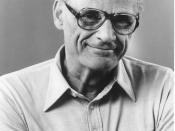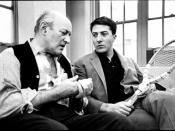Willy Loman as a Tragic Hero
The tragic hero, as defined by Aristotle in his works "Poetics" is one who falls from grace into a state of extreme unhappiness. According to that definition, Willy Loman, the husband and father in Arthur Miller's Death of a Salesman, can be classified as a tragic hero. Willy becomes increasingly miserable throughout the play as he falls from being a loving and successful father into a suicidal, delusional man.
Aristotle also noted that a tragic hero is not a bad person deserving of his misfortune, but instead has made a series of mistakes that lead him to his downfall. None of the mistakes Willy made were intentional, he was just ignorant that some of his actions were wrong. Loman's affair with another woman was not an attack on his wife, he simply felt lonely and sought attention away from home. Although he loved his wife and children, as he steps into an altered state of reality, Willy manages to alienate himself from seeing the things that he loves about his life.
His delusional mind was blind to the way his actions affected and destroyed his relationships.
Willy's obsession with being "well liked" also had a hand in his undoing. When Biff discovered Willy was having an affair, his perception of his father was weakened. And Happy, because Biff was older and the football star, was left without the praise and attention he needed. Furthermore, both children were greatly disturbed by their father's behaviour of talking to himself and living out moments from the past. Willy sees himself as a very important part of his family he believes being well liked is the reflection of success. Slowly, however, Loman begins to lose the respect and admiration of his family members as they witness his downfall.


